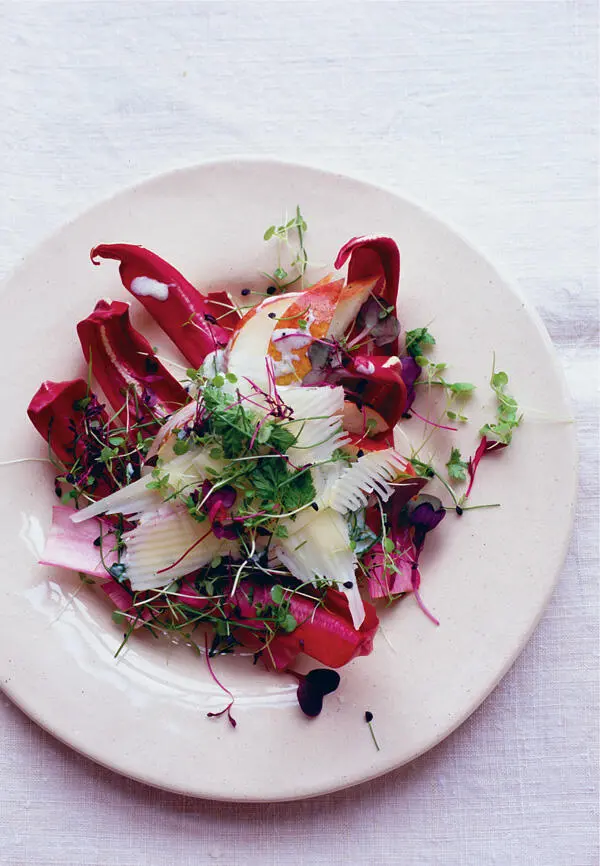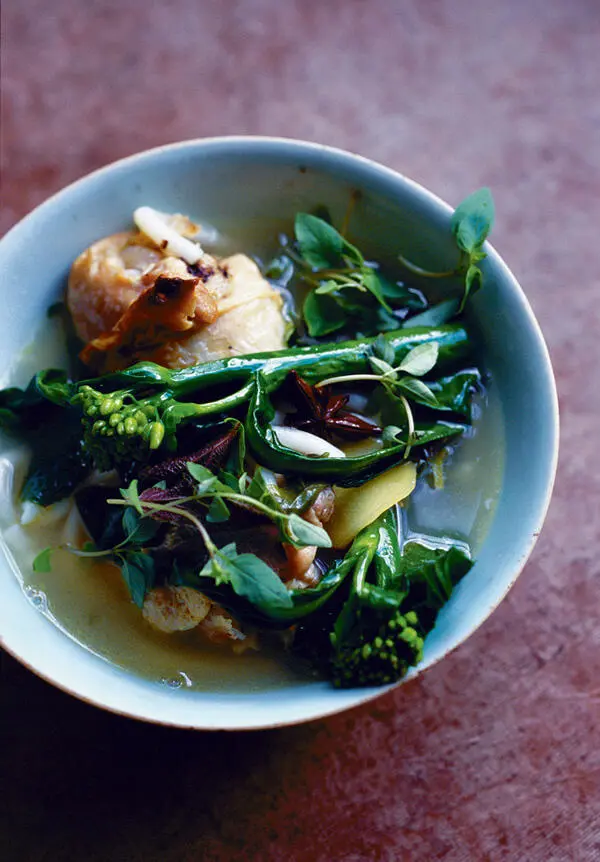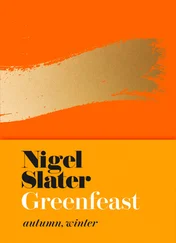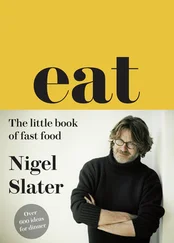butter: a thick slice
Arborio rice: 300g
a small glass of white wine or vermouth
To finish:
butter and grated Parmesan
For the Parmesan crisps:
finely grated Parmesan: 4 heaped tablespoons
Prepare the parsley. Pull the leaves from their stems, crack the stems with the back of a knife – their mineral scent is worth inhaling – then put them in a pan with the stock and bring to the boil. As the stock boils, turn the heat down to a low simmer. Finely chop the parsley leaves.
Peel and very finely chop the shallot and let it cook in the butter in a saucepan, without taking on any colour. Add the rice, turn the grains briefly in the butter till glossy, then pour in the wine and let it cook for a minute or two. Add a ladle of the stock. Stirring almost constantly, add another ladle of stock and continue to stir until the rice has soaked it all up. Now add the remaining stock, a ladle at a time, stirring pretty much all the time till the rice has soaked up the stock, the grains are plump and the texture creamy.
Stir in the chopped parsley, a thick slice of butter and a couple of handfuls of grated Parmesan. Season carefully.
For the Parmesan crisps, simply put heaped tablespoons of the grated Parmesan into a warm, non-stick frying pan. Press the cheese down flat with a palette knife and leave to melt. As soon as it has melted, turn once and continue cooking for a minute or so. Lift off with the palette knife and cool briefly. They will probably crisp up in seconds. Place on top of the risotto and serve.
Enough for 4

JANUARY 3
A crisp salad for a winter’s day
There are some pears and cheese left from Christmas, a couple of heads of crisp, hardy salad leaves still in fine fettle, and a plastic box of assorted sprouted seeds in the fridge. I put them together almost in desperation, yet what results is a salad that is both refreshing and uplifting, clean tasting and bright.
A salad of pears and cheese with sprouted seeds
Crisp, mild, light and fresh, this is the antidote to the big-flavoured salad. I prefer to use hard, glassy-fleshed pears straight from the fridge for this, rather than the usual ripe ones. Any sprouted seeds can be used, such as radish seeds, sunflower or mung beans. The easy-to-find bags of mixed sprouts are good here, too. The cheese is up to you. Something with a deep, fruity flavour is probably best, though I have used firm goat’s cheeses on occasion too. Rather than slicing it thickly, I remove shavings from the cheese with a vegetable peeler. A sort of contemporary ploughman’s lunch.
crisp pears: 2
bitter leaves such as frisée or trevise: 4 handfuls
firm, fruity cheese such as Berkswell: 150g
assorted sprouts (radish, alfalfa, sunflower, amaranth, etc.): a couple of handfuls
For the dressing:
natural yoghurt: 150ml
olive oil: 2 tablespoons
herbs, such as chervil, parsley, chives: a handful
Put the yoghurt into a bowl and whisk in the olive oil and a little salt and black pepper. Chop the herbs and stir them into the yoghurt.
Halve the pears, remove the cores and slice the pears thinly, then add them to the herb and yoghurt dressing.
Put the salad leaves in a serving dish. Pile the pears and their dressing on top. Using a vegetable peeler, shave off small, thin slices of the cheese and scatter them over the salad with the assorted sprouted seeds.
Enough for 2
The day that precedes Twelfth Night is often the darkest in my calendar. The sadness of taking down The Tree, packing up the mercury glass decorations in tissue and cardboard and rolling up the strings of tiny lights has long made my heart sink. Today I descend further than usual.
The rain is torrential and continuous. I clean the bedroom cupboards, make neat piles of books and untidy ones of clothes ready for the charity shop and make a list of major and minor jobs to do in the house over the next few months.
The local council collects discarded Christmas trees and recycles them for compost. I keep mine at home, cutting every branch from the main stem with secateurs and packing them into sacks. Over the next few weeks, the needles will fall and end their days around the blueberries and cloudberries in the garden. There is much that appeals about this annual cycle of the tree going back into the earth.
You would think that this day of darkness would be predictable enough for me to organise something to lift the spirits – dinner with friends or a day away from home. But the consequences of evergreens left in the house after Twelfth Night is too great a risk, even though this superstition is quite recent. So a day of dark spirits it is.
After yesterday’s darkness and self-indulgence, I open the kitchen door to find the garden refreshed after the rain. The air is suddenly sweet and clean, you can smell the soil, and the ivy and yew are shining bright. The dead leaves are blown away, the sky clear and white. There is a new energy and I want to cook again.
Today is an important day for those who grow their vegetables bio-dynamically, when the Three Kings preparation – a stir-up containing gold, frankincense and myrrh – is ground for an hour, then made into a paste with rain or pond water and offered to the land. Jane Scotter at Fern Verrow, the Herefordshire farmer from whom I buy the vegetables I cannot grow for myself (for which read most), says it smells ‘like a fine fruity Christmas cake’. ‘We do this to invite elemental life forces to help and guide us for the coming growing season. We ask for good things to happen and give the preparation as an offering to the earth and to give thanks for what the universe provides. It is a lovely thing to do and a chance to walk around the farm on a route not usually taken, holding thoughts of thanks and wishes to the farm on a spiritual level.’
Hippy-dippy hocus-pocus it may sound, but I have far less of a problem believing in this than I do many of the religious ceremonies practised by millions. Actually, much less so.
My energy and curiosity may be renewed but the larder isn’t. There is probably less food in the house than there has ever been. I trudge out to buy a few chicken pieces and a bag of winter greens to make a soup with the spices and noodles I have in the cupboard. What ends up as dinner is clear, bright and life-enhancing. It has vitality (that’s the greens), warmth (ginger, cinnamon) and it is economical and sustaining too. I suddenly feel ready for anything the New Year might throw at me.

chicken pieces and wings: 400g
black peppercorns: 8
star anise: 2
half a cinnamon stick
palm sugar: a scant teaspoon
fresh ginger: a small lump
fine, rice noodles: 200g
greens: about 400g
Thai or Vietnamese basil: a small handful
Make the chicken broth: put the chicken pieces and wings in a deep pan with the whole peppercorns, star anise, cinnamon stick and palm sugar. Peel the ginger, cut it into coins and add to the pan. Pour in a litre of water and bring to the boil. Turn down the heat and leave to simmer, at a gentle bubble, for twenty-five minutes. Remove from the heat and set aside.
Cook the noodles according to the instructions on the packet, then drain and set aside. Trim, wash and lightly steam the greens, then refresh under cold running water.
Читать дальше














